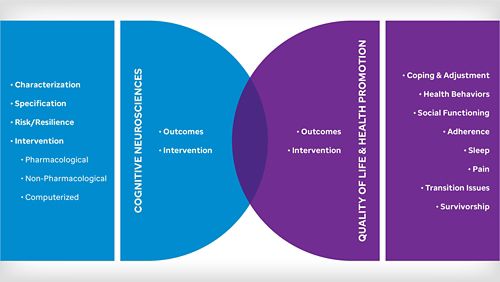St. Jude Family of Websites
Explore our cutting edge research, world-class patient care, career opportunities and more.
St. Jude Children's Research Hospital Home

- Fundraising
St. Jude Family of Websites
Explore our cutting edge research, world-class patient care, career opportunities and more.
St. Jude Children's Research Hospital Home

- Fundraising
The Department of Psychology and Biobehavioral Sciences is comprised of faculty members with highly productive and innovative research programs that span outcomes research and clinical trials. Results from our research studies offer insights that guide modifications in the delivery of front-line therapy and the development of interventions to improve survivorship outcomes for children facing cancer and other catastrophic illness.
Our Clinical Investigation Faculty form a collaborative team of psychologists and neuropsychologists who work within the department and across the institution to advance our ability to conduct research and provide care that enhances the overall quality of life for children with catastrophic disease.
Research Focus Areas
Research areas within the Department of Psychology and Biobehavioral Sciences fall into two broad categories—Quality of Life and Health Promotion and Cognitive Neurosciences. Departmental investigators may have research interests that bridge both areas, and our Faculty strive to:
- Describe the occurrence of psychological, neurocognitive, and neurobehavioral outcomes associated with diagnosis and treatment of childhood disease in order to identify risk/resiliency factors and increase understanding of underlying causes.
- Develop and test innovative and high-impact behavioral and cognitive interventions that are suitable for widespread dissemination and are designed to prevent or reduce acute and long-term complications of treatment and/or remediate treatment-related deficits.
Our translational approach utilizes the findings from our outcomes research to inform the development of novel interventions.
Institutional Collaborations
Collaboration is a defining element of our approach to clinical investigations. To advance research initiatives within the Department of Psychology and across St. Jude, our Faculty partner with major institutional programs and centers to conduct research activities.
Our collaborative efforts span the breadth of St. Jude, from programs within the Comprehensive Cancer Center to research efforts with other departments and specialized institutional programs. The integration of Psychology and Biobehavioral Sciences investigators and protocols within these programs and initiatives serves to advance discovery and care for children with catastrophic diseases.
Department of Psychology Initiatives & Programmatic Collaborations
Comprehensive Cancer Center Programs
Specialized Institutional Programs
Psychology Clinical Trials
Protocol-based psychological assessment is often conducted as part of therapeutic clinical trials, in which assessment batteries are designed to answer specific research questions and imbedded interventions guide therapeutic care. Following protocol-based assessment, families are provided brief feedback, and clinical assessment may be recommended if areas of weakness are identified.
The Department of Psychology and Biobehavioral Sciences also conducts independent, supportive protocols investigating long term effects of therapy, quality of life, and interventions to improve health behaviors, psychological functioning, and cognitive outcomes in patients with cancer and hematological disorders.
